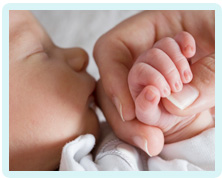
Outcome of Primary Repairs vs Secondary Repairs
The outcome of a 3rd or 4th degree tear will be much better if a primary repair is performed, rather than a secondary repair.
Outcome of primary repairs
The outcome of a 3rd or 4th degree tear can be good, as long as the injury is repaired quickly – meaning in the hours after the birth. This has been verified by two different studies.
The first was performed by Sultan and Thakar who assessed the outcome of a 3rd degree tear in women who had undergone a primary repair (i.e. a repair shortly after childbirth). In their study, 39% of women were incontinent of flatus and stool, and 14% were incontinent of stool with or without faeces.
The second was performed by Ramalingam et al who assessed the outcome of 3rd and 4th degree tears six months after a primary repair. In their study, 85% of women were free of symptoms after six months, and 14% had developed faecal incontinence.
Therefore on the balance of probabilities, a 3rd or 4th degree tear that is immediately repaired will produce a good outcome and the patient will be free of symptoms after six months.
Outcome of secondary repairs
If the opportunity to perform a primary repair is missed, the outcome of a 3rd or 4th degree tear will not be as good. In fact, it is highly possible that the patient will go on to develop anal sphincter dysfunction.
This injury will manifest itself through symptoms such as faecal urgency, faecal incontinence and incontinence of wind (flatus). These symptoms do not always arise immediately after the birth, and it can take months or even years for issues to develop.
If an injury to the anal sphincter is not identified clinically at the time of delivery, it means the tear must have been missed by medical practitioners. The attending doctor or midwife is supposed to examine the perineum and anal sphincter after the birth, providing the chance to diagnose a severe tear.
If a tear is not diagnosed, it either means a proper examination was not conducted, or the medical practitioner failed to spot the injury. In both scenarios, there will be a case of medical negligence.
Have I been the victim of medical negligence?
Did medical practitioners fail to diagnose and treat your tear after giving birth? Or was the repair of a poor standard, leaving you symptomatic? If you answered yes to either of these questions, there is a good chance that you will be entitled to pursue a medical negligence claim. One of our solicitors will be able to tell you more.
For more information on pursuing a claim for compensation, please get in touch with us today.
Can We Help You With A Birth Injury Enquiry?
We offer No Win No Fee funding for medical negligence claims which we will discuss with you during your free initial telephone discussion.
Would You Like Assistance from Specialist Birth Injury Claims Solicitors?
If you would like to benefit from a service of excellence with total commitment to client care from a small and friendly team, Glynns are ready and waiting to help you.
Please call us on 0800 234 3300 (or from a mobile 01275 334030) or complete our Online Enquiry Form.



